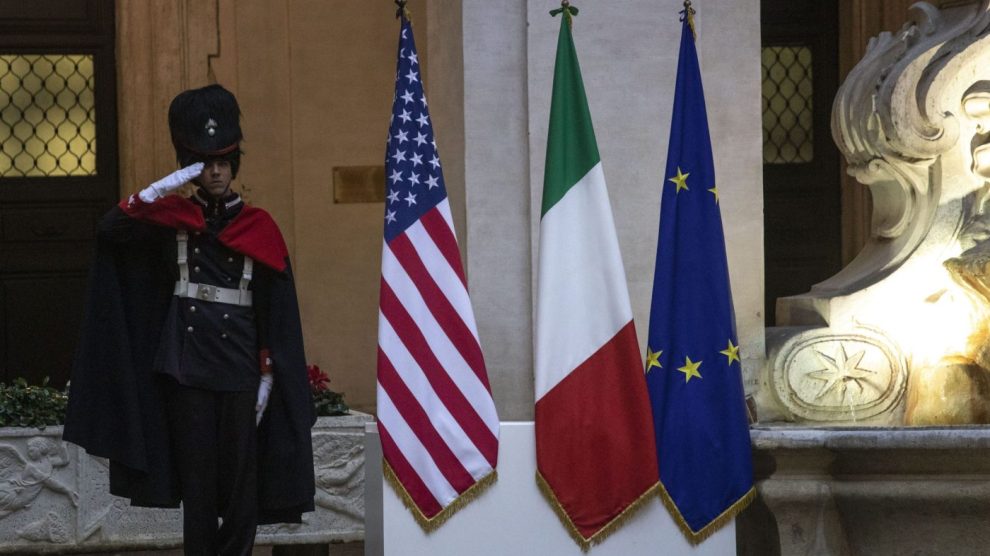Donfried’s diplomatic legwork. US Assistant Secretary of State for Europe, Karen Donfried, showcased the willingness of the Biden administration and the Meloni government to maintain constant contact and strong coordination at the official level with her three-day visit to Rome.
- She met with representatives of Italian think tanks as well as with Raffaele Fitto, Minister for European Policies; Ambassador Francesco Talò, Diplomatic Advisor to Prime Minister Giorgia Meloni; and Ambassador Ettore Sequi, Secretary-General of the Foreign Ministry.
- The topics of the meetings were support for Ukraine, the strengthening of transatlantic relations, economic cooperation, Italy’s role in the European Union, NATO and the Quint, as well as the challenge posed by autocracies – Russia and China first and foremost – to democracies.
- While in Washington, before leaving for Italy, Ms Donfried had received Italian Ambassador Mariangela Zappia at the State Department. The latter met Steve Scalise, the House Republican majority leader, on Wednesday.
Zooming out. It is worth reading the note issued by the Italian Ministry of Foreign Affairs after the meeting between Mr Sequi and Ms Donfried. The two “reaffirmed the excellent state of bilateral relations between Italy and the United States,” confirmed by several recent meetings:
- the one between PM Meloni and US President Joe Biden on the sidelines of the G20 summit in Bali, Indonesia;
- the one between Deputy PM and Foreign Minister Antonio Tajani and US Secretary of State Antony Blinken on the sidelines of the G7 summit in Münster, Germany;
- and the recent mission in Rome that saw Deputy Secretary of State Wendy Sherman meeting with Messrs Tajani, Talò and Sequi, as well as Ambassador Elisabetta Belloni, Director of the Italian Security Services. On that occasion, the Taiwan dossier made its debut in the bilateral report.
The Sequi-Donfried meeting. During the talks, the Italian MFA’s Secretary-General “expressed his strong appreciation for the excellent coordination achieved within the G7, NATO and the Quint format.” He also recalled Italy’s unconditional support to Ukraine, as well as Rome’s “convinced adherence to the sanctions framework […] to keep up the pressure on Moscow and foster the conditions necessary to achieve a just peace in Ukraine.”
- The two also “agreed on the importance of intensifying diplomatic action, also in the Quint sphere, for the stabilisation of the Western Balkans and the relaunching of the Euro-Atlantic integration path.” Finally, they “had an exchange of views on relations with China.”
Introducing: Riccardo Guariglia, currently the ambassador to Spain, who will soon replace Mr Sequi at the helm of the MFA as Secretary-General. He has experience at the NATO headquarters in Brussels and will complete FM Tajani’s reshuffling.
- Other new names include Francesco Genuardi (former ambassador to Brussels and consul general in New York) as chief of staff. His deputy will be Cecilia Piccioni, former ambassador to Vietnam, with experience at the United Nations in New York and in Washington.
Scientific cooperation. Over the past few days, the 14th meeting of the Italy-US Joint Commission on Scientific and Technological Cooperation was held at the MFA. It opened in the presence of Maria Tripodi, Under Secretary for Foreign Affairs, and Monica Medina, Deputy Undersecretary for Oceans and International Scientific and Environmental Affairs at the US Department of State (in video link).
- Ms Tripodi and Shawn Crowley, chargé d’affaires of the US Embassy in Rome, signed a joint declaration recognising science and cooperation as key instruments for technological innovation and economic and social development. It also defined the scientific areas of greatest mutual interest: life sciences, physics and astrophysics, earth sciences, digital transition, quantum technologies, advanced materials, and energy production and transition.
Talò’s contacts. Returning from a trip to Washington is Ambassador Francesco Talò, PM Meloni’s diplomatic advisor. There he met with Ms Sherman, US State Department advisor Derek Chollet and, according to La Stampa, also with the White House Security Advisor, Jake Sullivan, with whom he had had a telephone conversation a few days earlier.
- As our sister website wrote, that was “an opportunity for the Italian side to stress the importance of the frequent talks on foreign policy and security” between Palazzo Chigi and the White House.
- On its part, the American side had reiterated its appreciation for the work of PM Meloni’s government on Ukraine, in full continuity with that of her predecessor Mario Draghi, and highlighted “the importance of reasoning prospectively on defence investments.”
The expert’s take. In recent weeks, Dario Cristiani – an analyst at the German Marshall Fund in Washington and a keen observer of US-Italy dynamics – had explained to our sister website that “some doubts persisted” in Washington right after the crisis that triggered PM Draghi’s fall, and during the month that followed the September elections that crowned Ms Meloni.
- Those doubts stemmed from the PM’s ideological roots, remarked the expert, as well as “some blatantly pro-Russian positions of some of the coalition’s majority shareholders.” Still, “the ideological distance was overcome by the need to work together on international issues of primary importance.”
- “As the weeks went by, however, many of these doubts faded away. In this sense, the choices made on foreign affairs played a very significant role, especially the firmness on the Ukrainian dossier and the diplomatic activism on the Balkan issues were perceived extremely positively.”
- Tensions with France and some passages on China are still seen in Washington as problematic, noted the expert, but these issues are not that salient in the overall picture as to create structural problems.
In addition to the “transatlantic responsibility” demonstrated by PM Meloni and her ministers, “I believe this result is also due to the ability of Italian diplomats to convincingly convey the priorities of the new government.” In this sense, argued Mr Cristiani, “political responsibility and institutional capacity are the two elements that have allowed Italian-American relations to continue on the tracks laid out by Mr Draghi.”




